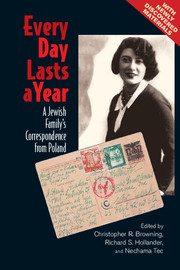Book contents
The Fate of the Jews of Cracow under Nazi Occupation
Published online by Cambridge University Press: 12 October 2009
Summary
This collection of letters to Joseph Hollander from various members of his family in Cracow is precisely that – a collection of family letters. They were not written to document the sequence of momentous historical events that their writers experienced or to describe graphically the suffering they endured. On the contrary, both fearful of the possibility of postal surveillance and anxious to reassure Joseph, the letter writers were consciously vague in their references to the political events and German policies of the time and understated in describing the immense difficulties of life that they faced during the first two years of the war in which their correspondence still reached the as yet neutral United States. Focused on deep personal and familial concerns, the letters by themselves provide neither a clear narration nor an explanatory context. Instead, many key factors affecting the lives of Cracow Jews are referred to obliquely or not at all. Wishing to be as nonintrusive as possible in annotating such personal letters, the editors have decided to provide two contextual essays – one concerning German occupation policies and the other examining the prewar and wartime situation of the Jews of Cracow, as well as an additional narrative concerning the recipient of the letters, Joseph Hollander.
When the German army began the invasion of Poland on September 1, 1939, the first response of many Poles, whether Jews or non-Jews, was to flee eastward because they could neither imagine the speed with which the advancing German army would overtake them nor foresee that the Soviet army would occupy eastern Poland after September 17, in accordance with the secret provisions of the Nazi–Soviet Non-Aggression Pact.
- Type
- Chapter
- Information
- Every Day Lasts a YearA Jewish Family's Correspondence from Poland, pp. 45 - 59Publisher: Cambridge University PressPrint publication year: 2007



